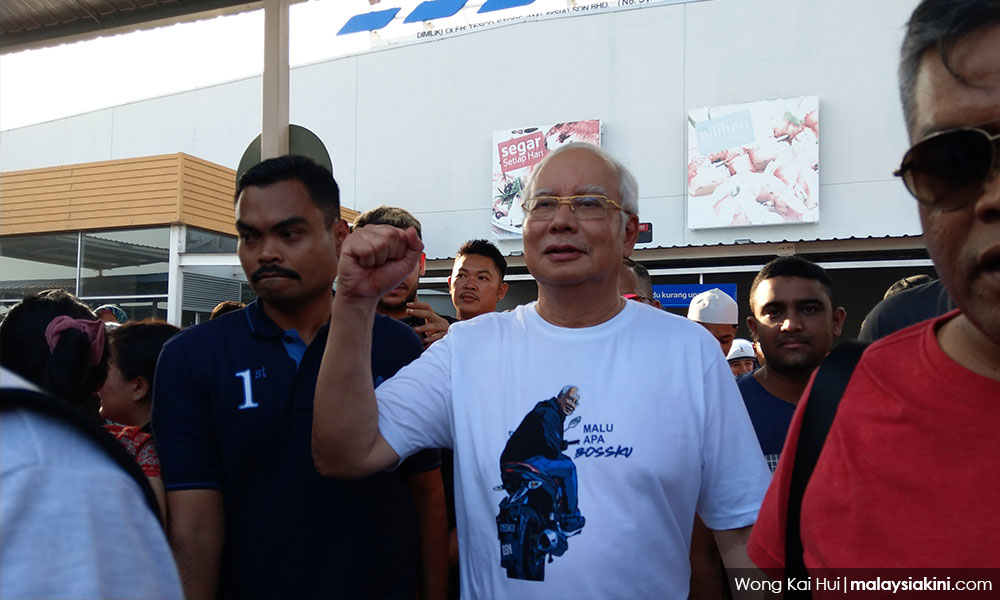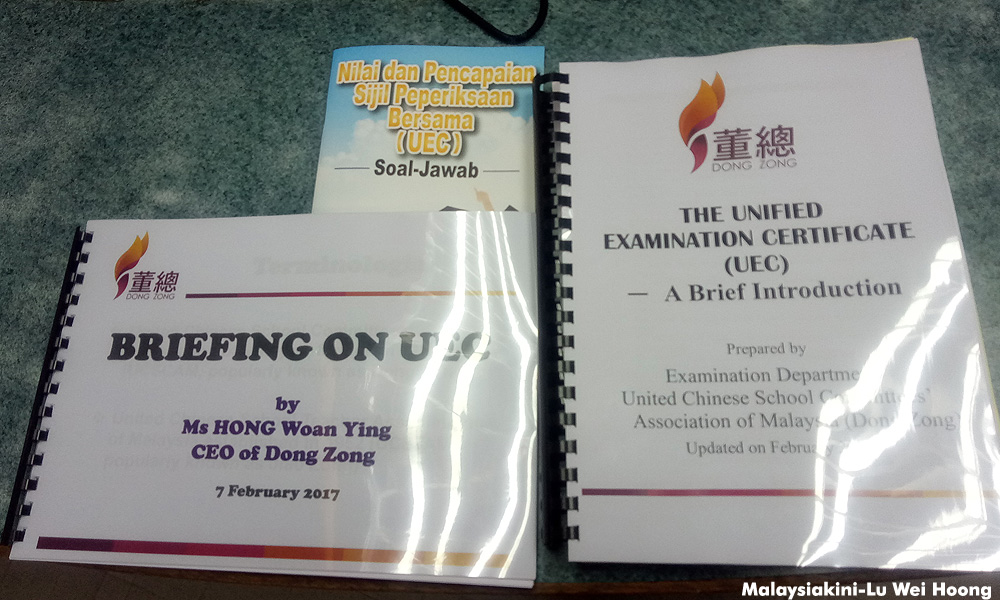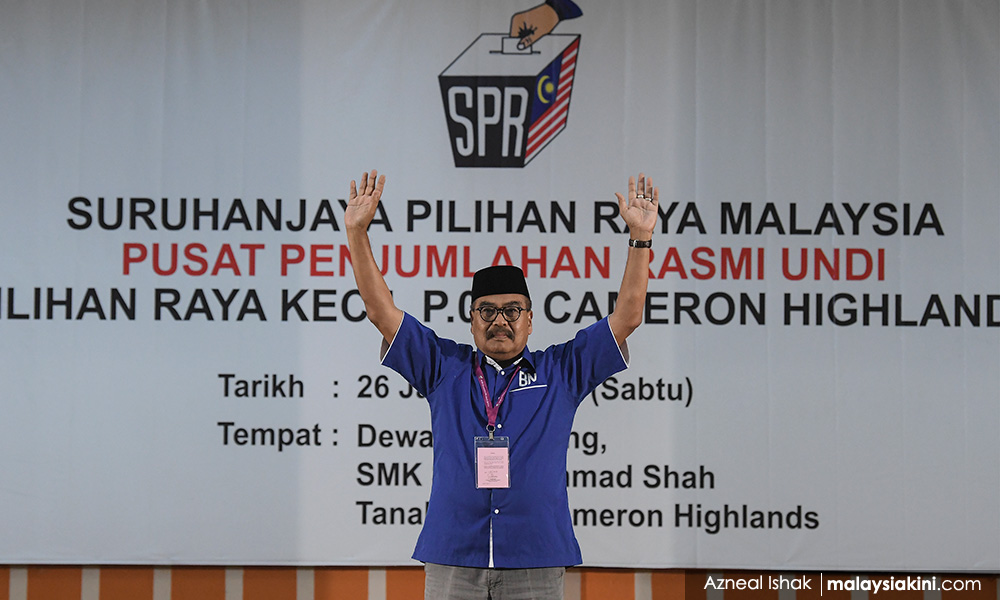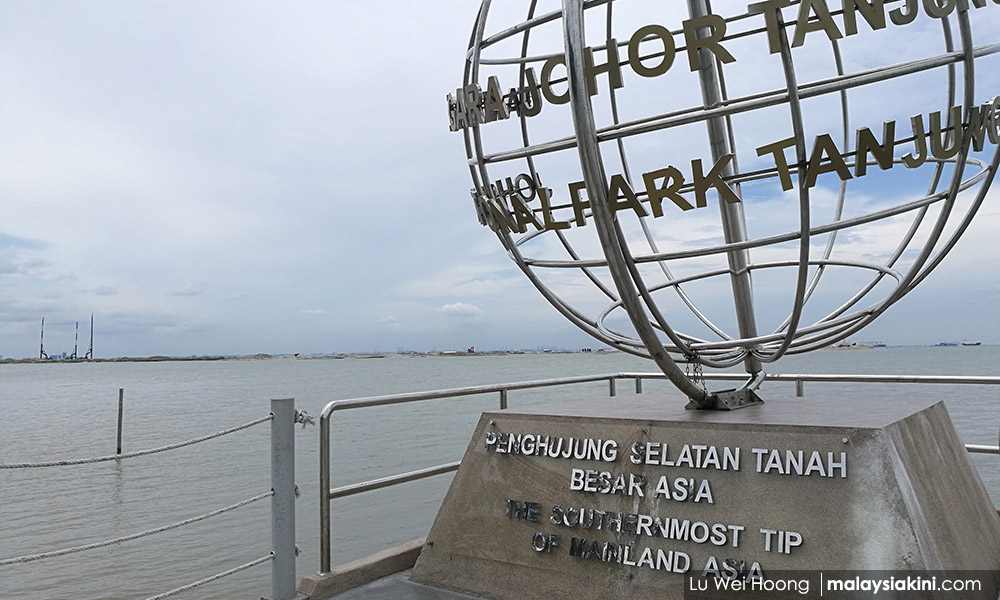
The by-election for the Tanjung Piai parliamentary seat in Johor is to be called following the death of its incumbent, former deputy minister in the Prime Minister's Department Dr Md Farid Md Rafik.
The Election Commission (EC) received the formal notice on the vacancy after Md Farid’s death last Saturday. A special meeting will be held by the EC in Putrajaya next Tuesday to decide on the dates for the nomination, campaigning period and voting day.
Malaysiakini has sorted out six key areas that will have an influence on this coming by-election.
(1) After winning five by-elections and losing three others, will Pakatan Harpan keep back the Tanjung Piai seat?
This by-election will be the ninth after the May 9, 2018, general election (GE14). The previous eight by-elections were held in Sungai Kandis, Balakong, Seri Setia, Port Dickson, Cameron Highlands, Semenyih, Rantau and Sandakan.
Harapan won five of the eight by-elections, losing three of the seats contested to the Barisan Nasional - in Cameron Highlands, Semenyih and Rantau.
Among Harapan's three defeats, the Semenyih by-election was the most significant loss as it won the seat in GE14, but failed to secure it just 10 months later.
Former prime minister Najib Abdul Razak went aggressive in the BN campaigns, after starting the "Bossku" campaign tactic during the Cameron Highlands by-election, leading BN to win three successive by-elections.

The three successive victories also strengthened the collaboration between Umno and PAS. Harapan's political fortune was later turned around - in the Sandakan by-election.
After over a year in power, Harapan's honeymoon is certainly over. The result of the Tanjung Piai by-election will show the latest support level of the people for Harapan.
(2) After the official Umno-PAS collaboration, where are the Malay votes going to?
Racial and religious issues are constantly raised by Umno and PAS leaders after GE14. From the row over the International Convention on the Elimination of All Forms of Racial Discrimination (Icerd) to the death of fireman Muhammad Adib Mohd Kassim and the introduction of khat in primary schools, leaders from the two parties kept criticising Harapan for not protecting the Malays and Islam. This narrative has put Harapan in a position of weakness.
About 57 percent of the voters in Tanjung Piai are Malays. Umno and PAS are expected to use racial and religious issues in their campaigns for this parliamentary seat.
The deceased MP Mohamed Farid, of Bersatu, secured 21,255 votes in GE15 and won the seat with a small majority of 524 votes.
At that time, the MCA candidate, Wee Jeck Seng (photo, below), got a satisfactorily result of 20,731 votes, while the PAS candidate Nordin Othman obtained 2,962 votes.

In fact, Md Farid only secured the seats with 47.28 percent of the votes cast, while the total votes gained by BN and PAS came up to 52.7 percent. What would have happened if PAS did not contest the seat and voters who support PAS gave their votes to the BN instead?
After winning three successive by-elections, BN and PAS on Sept 14 this year signed a charter formalising their cooperation. As the first by-election after the official collaboration of Umno-PAS, the victory of Umno in Tanjung Piai will be a good start for them.
(3) Are the Chinese voters still hardcore supporters of Harapan?
There are 57 percent Malay voters, 42 percent Chinese voters and one percent Indian voters in Tanjung Piai. Similar to the Malay community, the Chinese community has been plagued with identity politics since the last election.
Some Chinese voters are quite dissatisfied with the way the government handling the issues of Icerd and the introduction of khat in primary schools. The delay of Harapan's promises, such as the recognition of the Unified Examination Certificate (UEC) held by Chinese independent high school students, also accumulated some dissatisfaction among the Chinese community.

At the height of the controversy over the introduction of khat, the dissatisfaction of Chinese voters has overwhelmed and some even smashed eggs at the service centres of DAP lawmakers - a hint perhaps that the coming by-election could be quite a challenge for Harapan.
However, Md Farid had a quite good reputation among the locals, which may reduce the loss of Chinese votes as well.
(4) Umno or MCA to contest?
Tanjung Piai used to be a traditional MCA seat and has been a stronghold of this BN member for decades - until it was defeated in GE14. The former president of MCA, Ong Ka Ting, was the MP for Tanjung Piai from 2004 to 2008.
Ong shifted to contest in the Kulai parliamentary seat during the 2008 general election, and Wee Jeck Seng replaced him in Tanjung Piai. Wee won two terms in 2008 and 2013, and after GE13, Wee was appointed as deputy minister of youth and sports.
Wee, who was defeated by Md Farid in 2018 with a small majority, has declared that he is ready to contest in Tanjung Piai again.
However, Tanjung Piai Umno chief Jefridin Atan has demanded that the BN leadership hands the seat over to Umno to contest. He also blamed MCA for refusing to give up its traditional constituency in GE14, causing the BN to eventually lose the seat.
However, MCA has claimed that it had way for Umno, several times in the past, to contest in Tanjung Piai.

There is actually another way to replace the idea of "traditional constituency". For example, BN fielded Ramli Mohd Noor (photo), who was hand-picked by Umno, as a so-called "direct candidate" for Cameron Highlands in its by-election. This parliamentary seat has been a traditional constituency of the MIC.
The larger proportion of Malay voters than the Chinese may be ammunition to back up Umno's desire to contest in Tanjung Piai.
While the Chinese make up just 42 percent of the voters there, any decision to replace the MCA candidate there with an Umno candidate is likely to get a backfire from the Chinese community. Plus, the Chinese community do not like PAS in general, and this sentiment may affect Umno as well.
(5) Political wresting within Bersatu
Tanjung Piai has been DAP's traditional constituency in the past, but the party made way for Bersatu to contest the seat in GE14. It is expected that Bersatu will continue to contest it in the coming by-election.
The political wresting within Johor Bersatu is continuing. The fractions within the party in the state became more visible when after the replacement of the Johor menteri besar.
New Menteri Besar Sahruddin Jamal was not appointed to be the new Johor Bersatu chief. Instead, Bersatu Tebrau division chief Mazlan Bujang, who was dropped from the state executive council last week, was appointed as the new Johor Bersatu chairperson.
Mazlan and the former MP Md Farid are believed to be Bersatu chairperson Dr Mahathir Mohamad's trusted followers, while Sahruddin is believed to be closer to former Johor menteri besar Osman Sapian's camp.
It is also a challenge for Johor Bersatu members to put aside their differences and cooperate with one another during the campaign for this by-election.
(6) Have Johor’s agriculture and fishery policies improved the voters’ lives?
Pakatan Harapan managed to win 18 of the total of 26 parliamentary seats in Johor in the last election, which was a huge contribution for the Harapan win at the federal level.
Just over a year later, Tanjung Piai has become the first by-election to take place in Johor. There are 53,528 voters in Tanjung Piai, and a large proportion of the residents are working in the agriculture, fisheries and tourism sectors.
Last year, Prime Minister Dr Mahathir Mohamad said that he wanted to scrap the monthly cost-of-living allowance provided for fishermen, but the Agriculture and Agro-based Industries Minister Salahuddin Ayub later clarified that the allowance scheme would continue and that the government even intended to raise the amount in 2020.
Last June, the Economic Affairs Ministry channelled RM3 million to upgrade the infrastructure and facilities at the fishermen’s jetty in Tanjung Piai.

However, the biggest challenge faced by the fishermen are the environmental impacts caused by the mega reclamation projects along coastal Johor. Work to reclaim than 3,000 hectares of along the coasts for the development of the Forest City project (photo) and the Tanjung Piai Maritime Industrial Park began five years ago, causing the livelihood of the fishermen to decline dramatically.
Reclamation of coastal land is continuing and the mangrove forests are disappearing. Much of the area that was once the sea is now filled with luxury sea view residences and a huge petroleum industrial zone that has been built on man-made land. The local residents are not likely to benefit from these developments.
For the farmers who grow vegetables and fruits, they will not benefit from the Federal Government Paddy Fertiliser Scheme and the Paddy Production Incentive Scheme as they are not paddy farmers.
Tanjung Piai National Park and Pulau Kukup National Park are located 13km away from each other. The two national parks are famous ecotourism destinations in Southern Johor.
Located at the southernmost tip of Peninsular Malaysia and thus the most southern point of mainland Eurasia, the Tanjung Piai National Park used to have a beautiful mangrove forest with many fireflies and attracted many local and foreign tourists.
However, a huge port and mega reclamation projects were approved for the areas adjacent to the Tanjung Piai National Park, despite the park being listed internationally important Ramsar Wetlands site.
The development projects have allegedly affected the ecosystem of the coastal environment and indirectly affected the ecotourism industry.
As to whether the government’s policies are really improving the people’s lives, the result of the Tanjung Piai by-election is expected to be seen as a clear indicator.

- Mkini



No comments:
Post a Comment
Note: Only a member of this blog may post a comment.